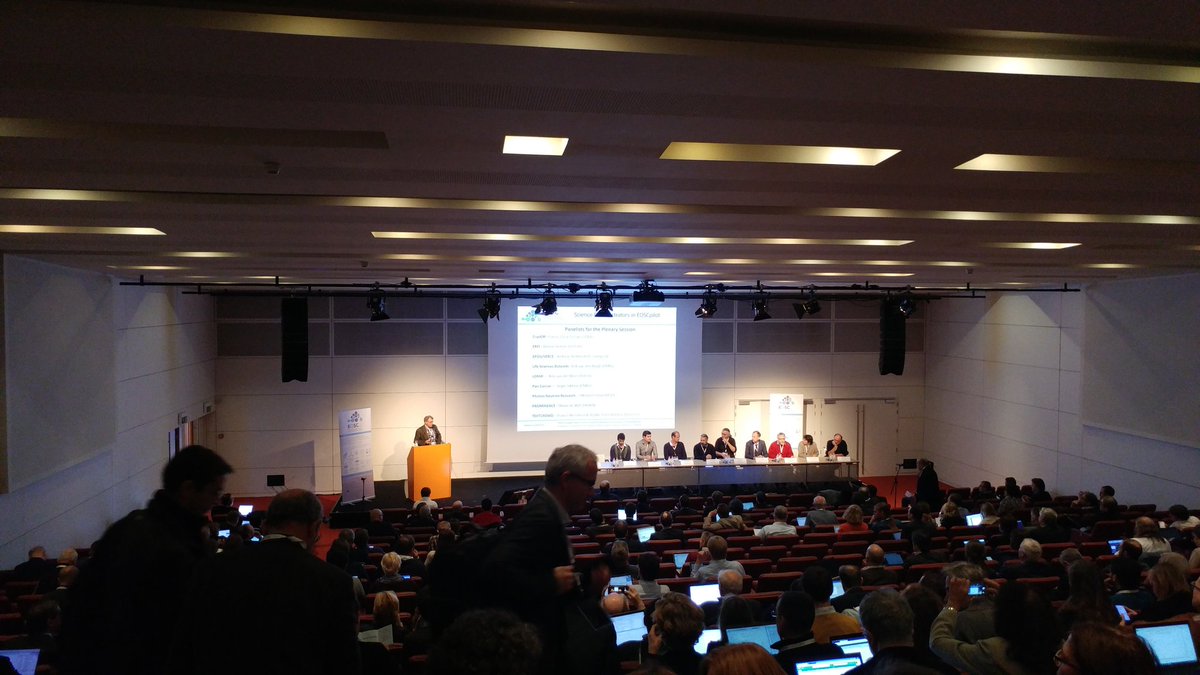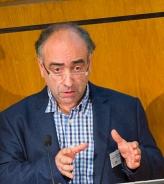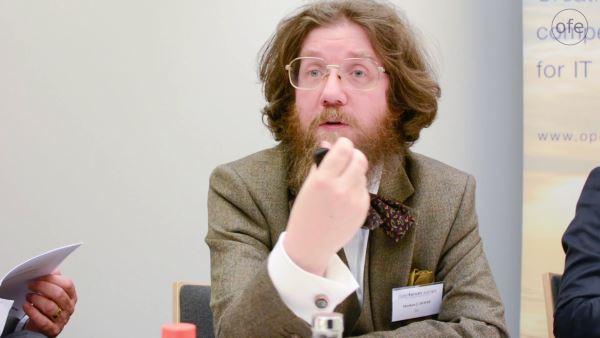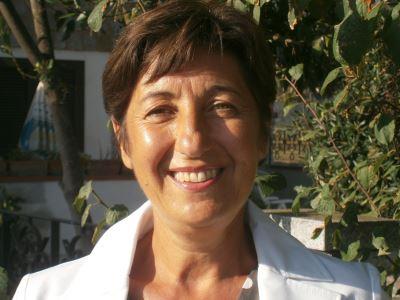
November saw the very first European Open Science Cloud (EOSC) Stakeholder Forum in Brussels. Held on 28 and 29 November 2017 and organized by the EOSCpilot project, the event gave over 300 participants the opportunity to learn about and contribute to shaping the future of the EOSC.
The EOSC will offer 1.7 million European researchers and 70 million professionals in science and technology a virtual environment with open and seamless services for storage, management, analysis and re-use of research data. The EOSC will cross borders and scientific disciplines by federating existing scientific data infrastructures, currently dispersed across disciplines and Member States.
In his keynote speech, Jean-David Malo, DG Research & Innovation, European Commission, identified the EOSC as an essential tool to foster Open Science. The EOSCpilot project represents the first targetted funding that the EC has given in what is a longer series of projects and future calls to achieve the EOSC.
 EOSCpilot and its annual EOSC Stakeholder Forum events are a vital first step for the EC in terms of identifying stakeholder requirements and building the blocks through a bottom-up approach in order to make European Open Science a user-friendly reality. Juan Bicarregui, STFC and EOSCpilot coordinator added “EOSC is all about enabling the sharing of technology, resources and data across different disciplines. To do that you need to collect the views of all different communities and service providers in order to bring together the key building blocks. Gradually and incrementally these can be brought together to create the EOSC.”
EOSCpilot and its annual EOSC Stakeholder Forum events are a vital first step for the EC in terms of identifying stakeholder requirements and building the blocks through a bottom-up approach in order to make European Open Science a user-friendly reality. Juan Bicarregui, STFC and EOSCpilot coordinator added “EOSC is all about enabling the sharing of technology, resources and data across different disciplines. To do that you need to collect the views of all different communities and service providers in order to bring together the key building blocks. Gradually and incrementally these can be brought together to create the EOSC.”
The forum was a key opportunity for researchers, scientists and service providers to share good practices and information on local initiatives to promote open science that could be generalised in EOSC. It also offered them the chance to learn more about the first year outputs of EOSCpilot, including the designing and piloting of stakeholder-driven interoperable services for the EOSC, a governance framework, and policies which incorporate funding and business models for the future sustainability of the EOSC.
Demonstrating the value of EOSC
Users should see the EOSC as a one-stop-shop to find, access, and use research data and services from multiple disciplines and platforms. Services and functionalities need to be user-driven and determined by clear use cases. This is exactly what the EOSCpilot project is addressing through 15 high-profile pilot science demonstrators across a range of research domains including Life Sciences, Humanities and Physics. It is not however, just demonstrating what works, but vitally, what needs to be improved. Results to date were presented at the event and reveal the diversity and lack of interoperability between existing infrastructures.
There is a strong need for greater collaboration in order to close the gaps and overcome the fragmentation of European infrastructures. Hardware and controlling mechanisms are needed to set up a European wide cloud infrastructure with regard to compute and storage resources either at the same location or connected by high performance networks. Resources for long-term archiving are also required. In addition, EOSCpilot is investigating policy issues which may present hurdles to the development and use of the EOSC and to its support for open science.
As EOSCpilot moves into its second year, these issues will be addressed. “EOSCpilot has already identified principles on data cataloging and how data will be exchanged between data catalogues and how they will be exposed to EOSC services” commented Carole Goble, ELIXIR-UK Head of Node during an interview. She continues “In the next year, four demonstrators will show how simple, small interventions and leveraging existing practices will ensure that communities can join the EOSC”.
Stakeholder-driven results
Research infrastructures, research e-Infrastructures and research communities clearly have a role to play in addressing these challenges. The event gave voice to these and other stakeholders such as intermediary users and other brokers of end-users demands (e.g. IT departments, umbrella associations, community networks) who should assist data scientists and ICT specialists in the identification of key requirements for EOSC services.
Similarly, governments, funders and industry have a role to play. Clear stakeholder engagement principles were a key component both of the event and also of future actions. The event was key in ensuring that EOSCpilot collects and acts upon the needs of these communities, in particular those of domain-specific Research Infrastructures which should include specific requirements related to “People-as-a-Service”.
There was consensus from all stakeholder groups on the need to think globally but to act locally with Research Communities. With the EOSCpilot, the very first step of an ambitious and long-term plan towards the EOSC, there is an inevitable sense of uncertainty among stakeholders regarding the complexities and diversity of target communities. It is important to shield researchers from underlying infrastructure as at the end of the day scientists just want to do science, and not worry about the complexity of the infrastructure.
A lightweight but effective governance framework
With so many scientific communities and stakeholders, the event highlighted how the EOSCpilot addresses cultural changes by proposing a governance framework for the EOSC which contributes to the development of European Open Science policy. What is clear is that this needs to be capable of supporting the definition, management and coordination of its many components without imposing a strict hierarchical model or supply chain.
 Matthew Dovey from Jisc and EOSCpilot commented that “EOSCpilot is developing a proposal for a lightweight but effective governance framework for the EOSC which puts the research communities and the researchers in the driving seat, whilst enabling national decision makers to prioritise the strategic objectives based on this strong steer.” He continues, “A key component of this is a stakeholder forum in which the stakeholder groups involved in supplying to and using the EOSC will engage in further developing what EOSC needs, in order to deliver and provide feedback on how it is performing”.
Matthew Dovey from Jisc and EOSCpilot commented that “EOSCpilot is developing a proposal for a lightweight but effective governance framework for the EOSC which puts the research communities and the researchers in the driving seat, whilst enabling national decision makers to prioritise the strategic objectives based on this strong steer.” He continues, “A key component of this is a stakeholder forum in which the stakeholder groups involved in supplying to and using the EOSC will engage in further developing what EOSC needs, in order to deliver and provide feedback on how it is performing”.
Developing the necessary skills and capabilities to enable the scientific community to take full advantage of the EOSC is key to creating wider awareness and bringing the opportunities offered by the adoption of Open Science to researchers.
Kevin Ashley, University of Edinburgh explains: “Building upon existing work, EOSCpilot is establishing a skills framework that will help infrastructures, institutions, and other stakeholders to find, access and benefit from relevant skill developments. EOSC can play a key role in raising awareness in the scientific community of the benefits of FAIR data. Researchers in particular need better education and guidance on Open Data and in particular the different initiatives and practices”.
A system of systems
Under this stakeholder-driven governance model are the actual services. EOSC is envisaged as a distributed, de-centralised, system-of-systems based on components independently provided and managed by different organisations. EOSCpilot is developing an architectural framework for tools to work together with open interfaces between them to provide a comprehensive and evolving set of services.
 Donatella Castelli, CNR-ISTI & EOSCpilot explains “Defining the EOSC system architecture is complex and we are following an iterative process which takes into account the better understanding of the open science approach, the related policy evolution, and the new technological developments that will be progressively achieved. What we presented at the event was a state-of-the-art view and will now map this model into the services that existing and emerging “systems” (e.g. e-Infrastructures and repositories) will provide to EOSC”.
Donatella Castelli, CNR-ISTI & EOSCpilot explains “Defining the EOSC system architecture is complex and we are following an iterative process which takes into account the better understanding of the open science approach, the related policy evolution, and the new technological developments that will be progressively achieved. What we presented at the event was a state-of-the-art view and will now map this model into the services that existing and emerging “systems” (e.g. e-Infrastructures and repositories) will provide to EOSC”.
This will support an open knowledge production lifecycle where outputs of the research process can be created, deposited, analysed, published and preserved, and discovered, accessed and reused. Furthermore, the EOSC service portfolio can grow incrementally according to stakeholder-defined principles and user needs. More incentives are required in various areas, to support FAIR data principles. The EOSC Governance Framework can play a role in fostering coordination of national-level policies.
Looking ahead to 2018
2018 will be a key year for EOSCpilot in terms of taking on board recommendations and discussions from the EOSC Stakeholder Forum event. The governance framework will be elaborated and co-developed with stakeholders while key architectural documents will also be published and interoperability issues addressed.
EOSCpilot will also engage with other key projects starting in 2018. EOSChub will integrate and manage EOSC services while OpenAIRE Advance will develop infrastructure for sharing publications.
